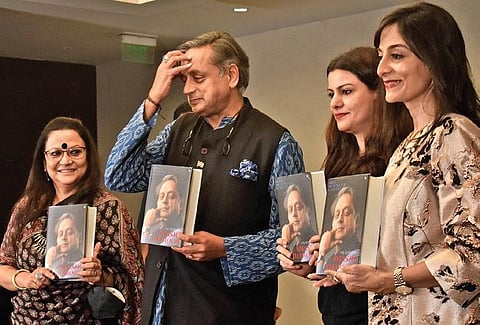

HYDERABAD: Parliamentarian, author and former diplomat Shashi Tharoor was in Hyderabad on Saturday to launch his 23rd book, Pride, Prejudice and Punditry which gives a panoramic view of the range and depth of his writing.
In conversation with journalist Nidhi Razdan at Park Hyatt Hyderabad, he dipped in and out of different sections of his book which is a compilation of 10 sections ranging from fiction, non-fiction, poetry and even cricket. Published by Aleph Book Company, it marks the culmination of over 50 years of Tharoor’s writings.
Speaking to a conference hall packed with the city’s elite, socialites and booklovers, Tharoor spoke about his passion for writing, missing humour in Indian politics, his self-censorship on social media and why India needs a presidential system.
Thanking his father for encouraging him to write since childhood, he said that he would like to get back to writing fiction.
“Four of my first five books were all fiction. That seemed to be my natural vocation; only the last 20 years of my writing have been non-fiction. The reason that happened has to be my work."
ALSO SEE:
"But the great merit of writing non-fiction is that it is uninterruptible. It’s very easy with non-fiction to pick up the trail, the thread of what you were thinking. But, I definitely want to get back to fiction,” says the Enid Blyton fan.
Humour in Indian politics
When asked about humour being seemingly lost in Indian politics, Tharoor cited his infamous ‘cattle class’ comment which had landed him in a soup.
“Social media has its magnifying effect. The fact is we are a multi-lingual culture; a joke might just work in one language, but may sound awful when translated in another, as it happened with ‘cattle class’. The dung hit the fan. Congress leaders were calling for my resignation. But I missed all that as I was on a flight to Africa (laughs),” he said.
But the incident reminded him of Shakespeare’s adage: the success of a jest lies not in the tongue of the teller but in the ear of the hearer.
“This is something that we all have to learn in politics. I still lose votes because of that (laughs). No politician can afford to be misunderstood like this. That’s why you see most of our politicians, they may have a good sense of humour, but the moment they are in public, they are very conscious.”
Running for UN Secy General
In his book, Tharoor also talks about his nomination to the UN Secretary-General's post.
“The idea came from then Prime Minister Manmohan Singh. In 2005, he had asked me if I would be interested in being nominated and I said, ‘Of course, Prime Minister. But the first thing we need to make sure is that China does not veto this.’ But it turned out that China supported my nomination and the Americans had voted against me. It was worth trying,” he said, responding to a question.
Tharoor, time and again, has been reiterating the need for a presidential system. Explaining his views, he said: “What I’m talking about is a system in which chief executives are directly elected by the people — for example, the town mayor, the village panchayat, the chief minister should be directly elected. In each of these cases, you will have somebody whom the voters have directly chosen, their bare individual merit is not tied to the number of parliamentarians that their party is able to elect. So, the elected person will no longer have an excuse of having to take a coalition partner along.”
He strongly believes that there is a need for separation of powers: the executive, legislature and judiciary.
ALSO SEE:
“Today, once Mr. Modi wins his 303 seats in Lok Sabha and becomes Prime Minister, he can literally do what he wants, legislatively,” he said.
Interactions with Modi
The book also has a chapter in which Tharoor talks about his interactions with the Prime Minister.
“I first met Mr Modi in January 2007 at the Pravasi Bharatiya Diwas in Chennai. It was over lunch, with a very few guests. I decided to ask him some blunt questions — about the 2002 Gujarat riots, the ghettoisation of Muslims in the State, his policies as Chief Minister. He was very impressive, he wasn’t rattled. He tells stories very well, but he took the trouble to answer my questions. I understood that he’s not someone to be underestimated,” Tharoor said, with a hint of sarcasm.
Pride, Prejudice and Punditry, which earlier launched in Delhi, is available on Amazon for Rs 705.